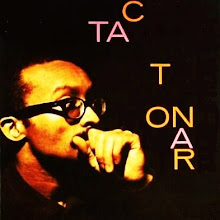Errol Parker Tentet
A Night in Tunisia : Sahara 1015.
Philip Harper
Michael Thomas
Doug Harris
Donald Harrison
Bill Saxton
Tyrone Jefferson
Patience Higgins
Cary de Nigris
Reggie Washington
and Errol Parker
It's time for some Errol Parker! Big band percussion business of the highest order.
He was brought up as a Sephardic Jew, although his devotion to African roots led him to downplay that background in his adult life. He began to play African drums at the age of six in his native Algeria, and both that instrument and the music of North Africa would play an important role in the eventual development of his idiosyncratic music. At 14, he heard a jazz record for the first time -- the ex-Ellington trumpeter Rex Stewart with Stephane Grappelli -- during an intermission at a cinema in Oran, and was so overwhelmed that he not only took to the music, but switched his attentions to piano in order to play it.
He moved to Paris at the age of 18 to study sculpture at the French National School of Fine Arts, a move which allowed him to get involved in the local jazz scene. He worked with several of the notable community of American expatriates in the city during the 1950s, including drummer Kenny Clarke and saxophonists James Moody and Don Byas, as well as a local hero, guitarist Django Reinhardt.
He had a hit with a single named "Lorre" in 1963 (a recording which he freely acknowledged signalled his devotion to the style of Erroll Garner at that time, and which he later renounced as a novelty made for quick cash), but a shoulder injury sustained in road accident shortly afterwards forced him to change his style to a less floridly virtuosic approach.
He did so successfully enough to capture the attention of Duke Ellington in 1967. Ellington published two of Parker's compositions through his own music publishing company, and encouraged the pianist to move to New York, which he did in 1968. That was a period of militant politics and raised awareness of African roots within black jazz circles, and the stress on Afro-centricity revived his own interest in his early roots and musical experiences with the African drums, and in turn led him to take up drums again as his main instrument.
He evolved an original approach, using an adaptation of the hand-drumming techniques of North Africa on conventional western drum kit. He took that approach a step further when he replaced the snare drum with a conga, a move which gave his overall sound an even more African-influenced sonority. In addition, he began to place his kit at the front rather than behind his band, further emphasising the importance of the rhythmic element of his music.
Parker formed his own record label, Sahara, in 1971, and advanced his theories in his Errol Parker Experience during the 1970s, but found his most productive vehicle for his ideas in the Tentet which he established in 1983. As the name suggests, this was a ten-piece band which became his primary unit throughout the rest of his life, and its ranks included many of the up and coming stars of the New York scene, including such players as Philip Harper, Donald Harrison, Steve Coleman, both Kevin and Robin Eubanks, and Wallace Roney.
Parker's highly integrated experiments with tonality, layered time signatures and polyphonic ensembles were rooted in the jazz mainstream as much as the legacy of his native land, but never succeeded in bringing him a wide audience. His colourful, unconventional autobiography, A Flat Tire On My Ass, was published in 1995, partly in an unsuccessful attempt to foster greater interest in the band.




will it be the whole album?
ReplyDeletea fantastic new, many thanks
http://www.mediafire.com/?1v38r56yqdf98ff
ReplyDeletetracks 1-4
http://www.mediafire.com/?4x1m7mx3gif5yma
ReplyDeletetracks 5-8
Thanks Katonah, I'm a fan of Errol Parker, I knew he recorded in France but didn't realise he was of Algerian extraction.
ReplyDeleteMuchas gracias, Ketonah. This should be a treat. Appreciated.
ReplyDelete